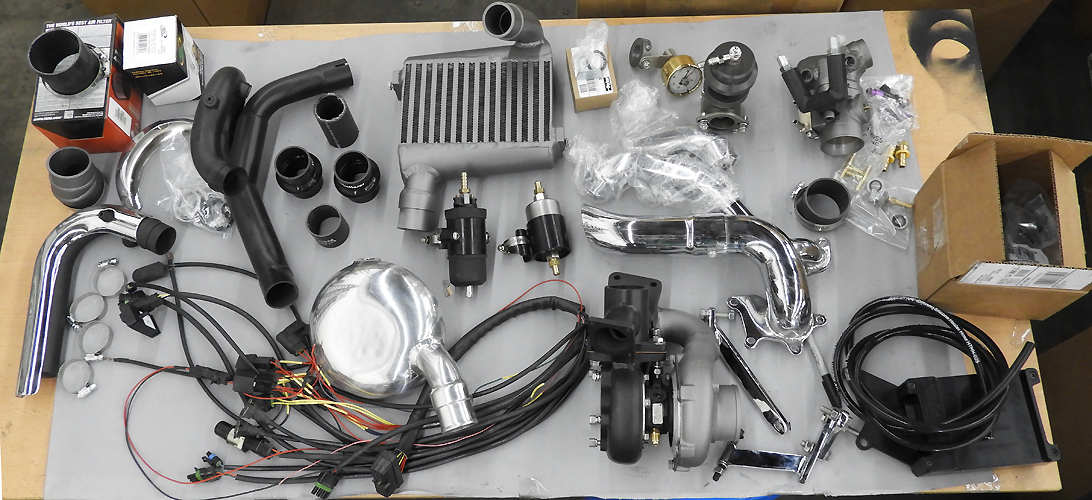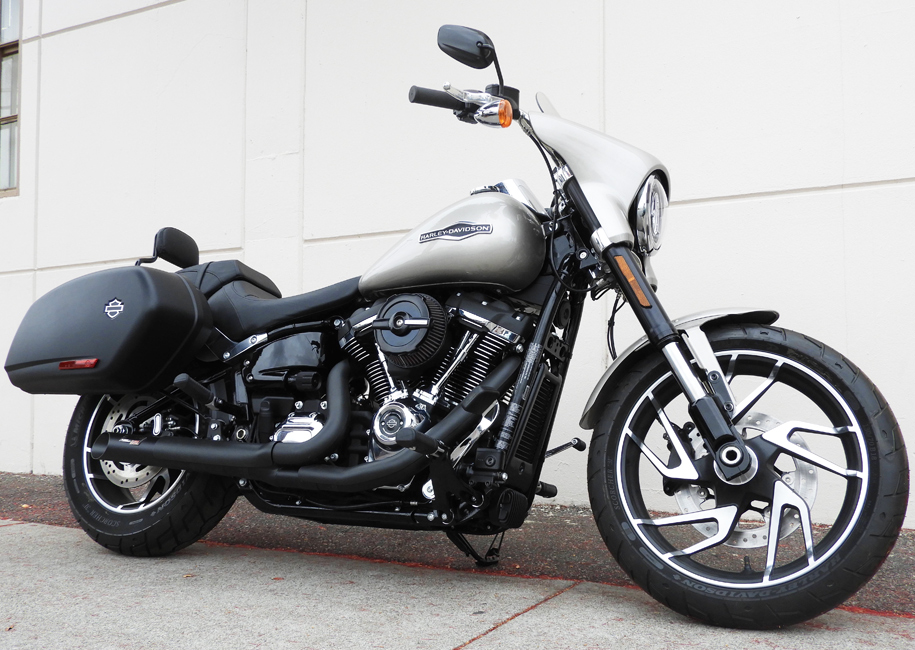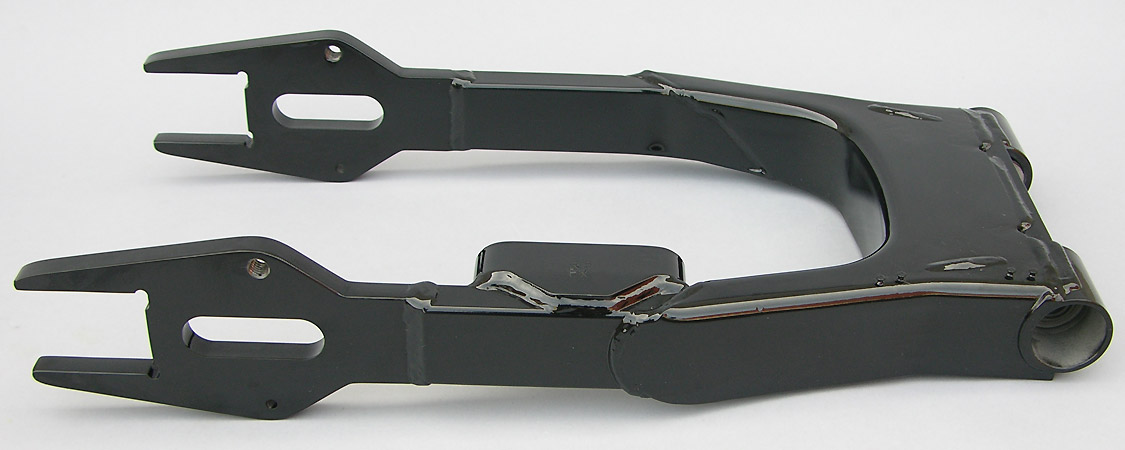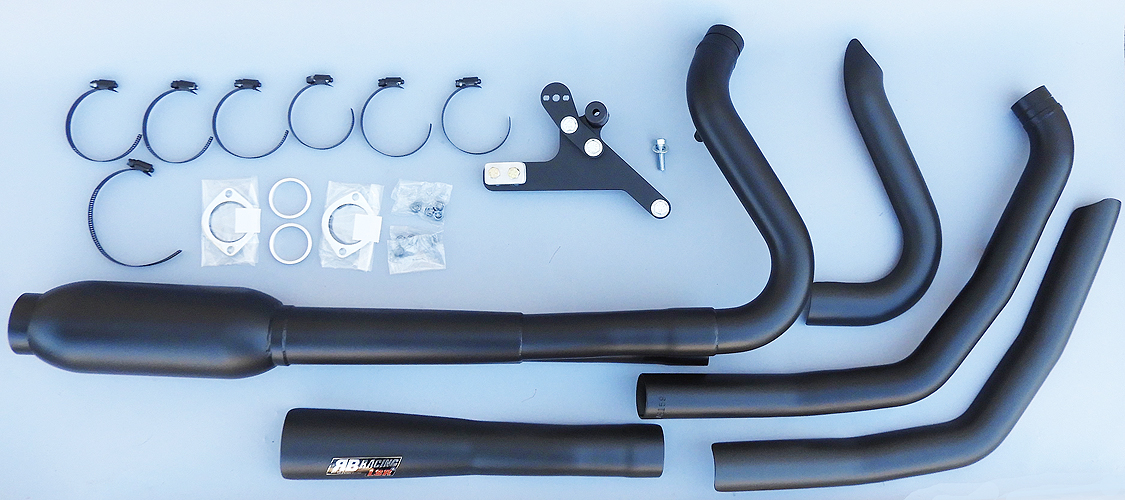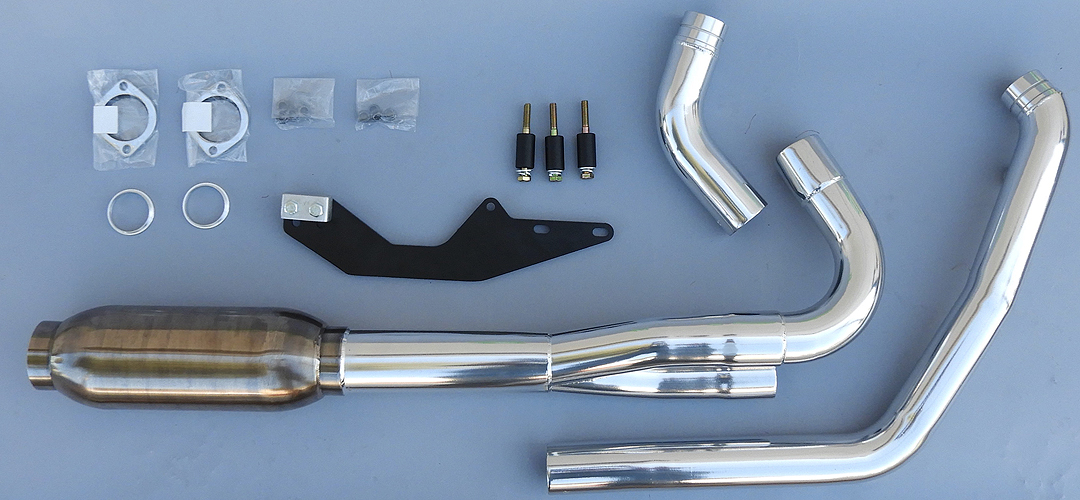|
|
About RB Racing
The need for Speed
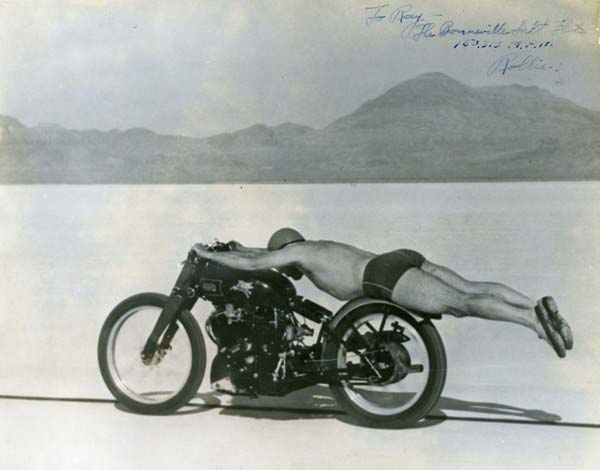
First visited Bonneville (Search the exact phrase "Bonneville Salt Flats") in 1958...bought a Rollie Free/Vincent
post card.
Bonneville 1958
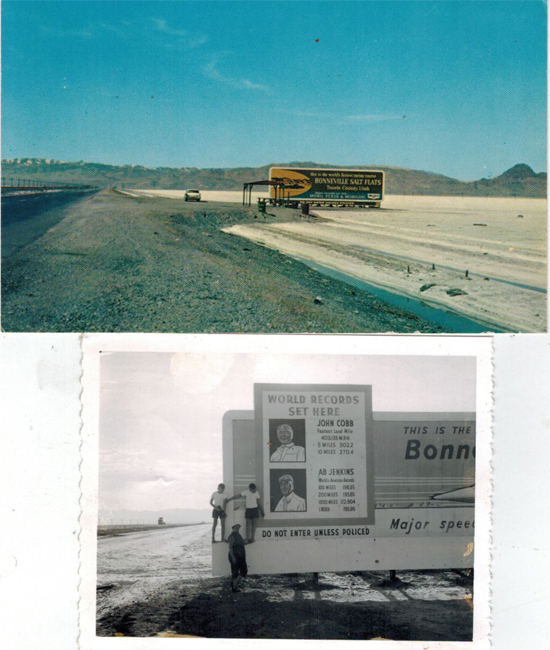
1974 Los Angeles
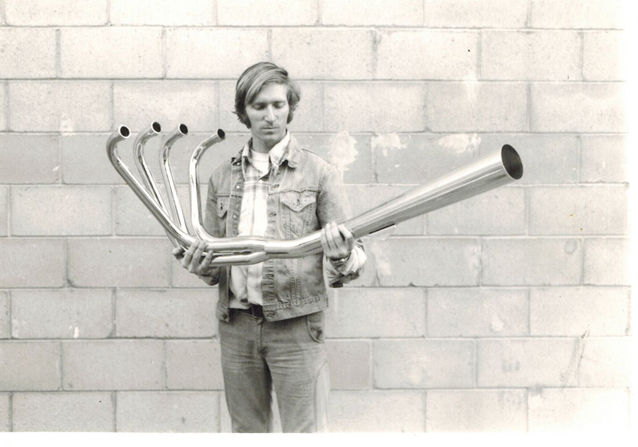
1974: Three months in Los
Angeles before returning to Europe to begin preparations with suppliers
on both sides of the Atlantic to race at the Bol D'Or 24 hour
race in France. Designed this merge collector four cylinder exhaust or
sale in Europe, manufactured in Los Angeles. Dual radius primaries:
2.5" at ports and 6.0" leading to merge collector. Way ahead of its
time.
1972-1976 imported US motorcycle products into Europe
selling high performance parts, racing chain, tie-downs, shock
absorbers etc., to European race teams. Also specialized in high
performance brake systems selling AP Lockheed, Scarab, Brembo, and
Fontana brakes to European constructors like Hermann Schmid (GP sidecars).
1976-1977 Built special Monoshock, Kawasaki Z-1 powered Endurance Racing chassis in Los Angeles...Taking first USA team in 41 years to 24 Hour Bol d'Or Race at Le Mans, France. 390 lb., 24 liters gas, 3.5 sec Quick-Fill Systems, 165mph. Sponsored by Joe Miller, Tri-Mil Industries; and Russ Collins, R.C. Engineering; Michelin France; Total Petroleum France; Amortisseurs DeCarbon; Champion Spark Plugs; Jerry Greer, Camber Fairing..and Dave and Vic... Born in the USA.
1977 Bol d' Or - Behn Monoshock, Click on photos to enlarge
1978
Won 24 hour races: St. Louis, W. Palm Beach with Monoshock chassis.
Various pilots included: Roland Freymond, Gilbert Piot, Jean Paul
Chaubert, Francis Erard, Gary Scott, Lang Hindle, Greg Cox, Peter
Cooper, Charley Finney, Gene Harris, Frank Mrazek, Carry Andrew, Gary
Gates, Sam Williams, Jim Kress, Ed Hileman, Terry Statum, Paul
Turnbull. Produced customer versions for Kawasaki Z-1, CB750, Suzuki
1000.
Behn Monoshock Development and Bol D'Or
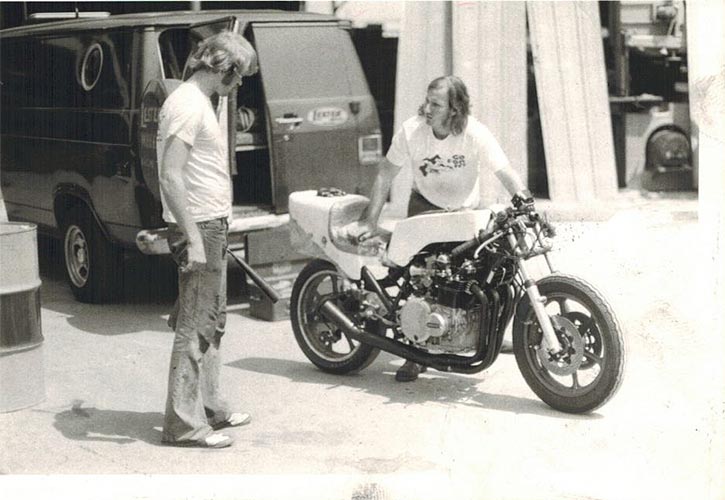
Lang Hindle left and Gary
Gates right. Gary did the frame fabrication for three Behn Monoshock
chassis at our base at Tri-Mil after dealing with a certain hard head
fabricator who liked to drop chocolate mescaline and make aluminum
railings for Disneyland. One frame was used for testing and then after
Nelson Ledges 24hr test we raised the engine position 5 cm...and Gary
made two new chassis (46 and 47) for the Bol D'Or. No one else.
We based our engine
assembly at MTC engineering in South Gate with the ex preacher Ken
Tipton, but we pulled out of MTC after Ken stole virtually all the
$5,000.00 of supplies that Randy Hall of Kawasaki USA Racing had furnished for
our engine assembly. Pops Yoshimura provided us new blank engine cases for
the project. He spoke no English but liked cash. Dave and Vic supplied
the donor motors L.A. style. Gary provided the phony Texas license plates.
Note the prototype bodywork. We made one initial tank (pictured above) for testing the quick fills. Jerry Greer of Camber Fairing thought he had a better idea and made a roundish 8 gallon blimp tank that we ran at Nelson Ledges. After Nelson ledges we again designed newer 6 gallon gas tanks using foam blanks and wax incorporating the quick fill valves. Our testing showed, with the tubular backbone splitting the tank, we needed to move the two quick fill ports to the back edge of the tank for a 3 second fill. That's why the top of the tanks were flat and deep at the rear.
People like to use these black and white images that we published implying they were there. They weren't (Vinsky).
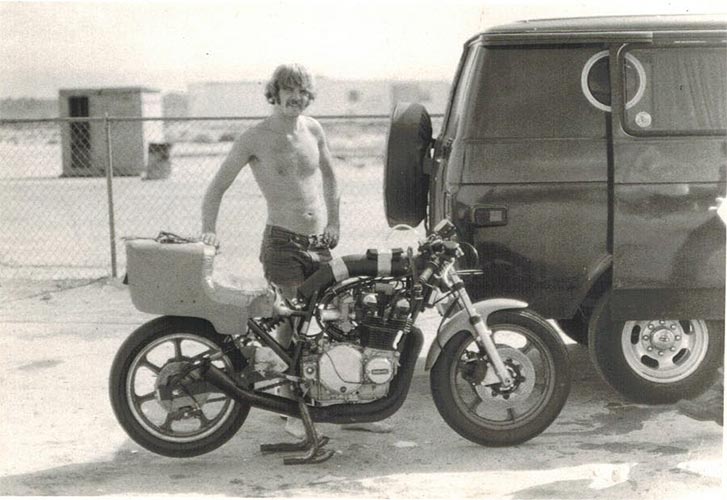
Here is Lang at Willow Springs where we did the initial testing prior to going the the 24h test race at Nelson Ledges. Ride around Willow sitting on the tail section with Lang going full tilt. That was interesting. The track management went to lunch and left us alone. Ride the track backwards. Those days are long gone.
Count the spokes. The rear
wheel is a seven spoke Morris Magnesium wheel with a cush hub from a
Kawasaki LTD. The front wheel is six spokes, made from aluminum, and
came from the Maserati foundry in Italy.
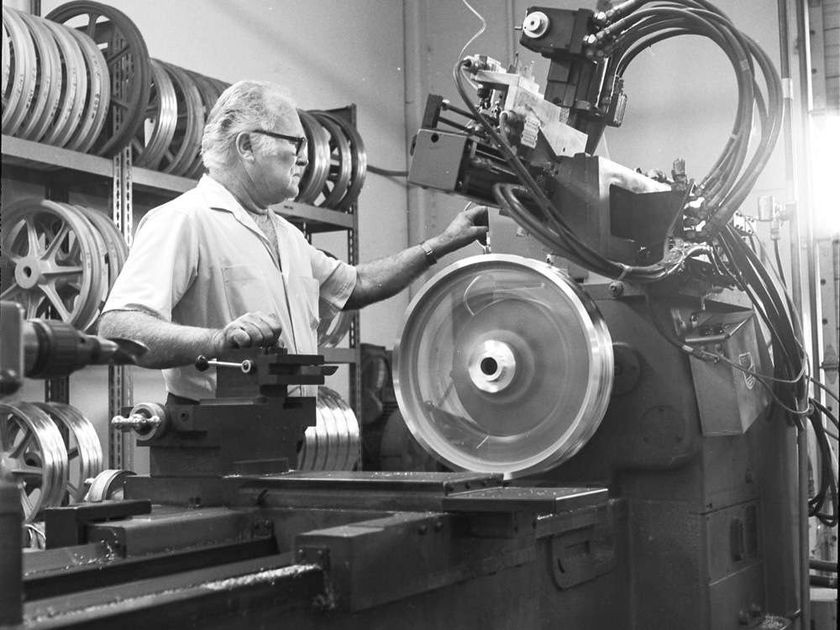
The late Elliot Morris,
famous for his seven spoke magnesium and aluminum wheels. As we were
running his magnesium rear wheel Elliot had doubts a direct bolted
sprocket would survive the 24h...So he came up with the idea of using a
Kawasaki LTD cush hub. Great guy, very smart. We were with him
when he got fed up with foundries, rejected castings, and he put in his
own furnaces. An engineers engineer.
When we asked Elliot Morris
"Why seven" he said the human eye liked odd numbers and 7 gave better
support than 5 spokes, with triangulating spokes on the opposite face.
Elliot Morris supported our effort loaning us a Dodge Van to shuffle
parts around with that we launched into the air over the railroad tracks in Compton...no damage. Elliot, early on, was a mechanical engineer at Packard
Motor Company designing mechnical linkages. Interesting guy.
We had tested the, new at the time, spun Mitchell wheels
but they were sensitive to side winds and not as true as the machined
cast wheels. We consulted with both Tony Mills at Dunlop and Elliot
Morris to set the rim
widths to Grand Prix specs. We toyed with running wider front tires but
were advised against it. We ran Michelin slicks in France.
Team members wanted to run skinny KR91 Dunlops but that was just not going to cut it in this level of competition.
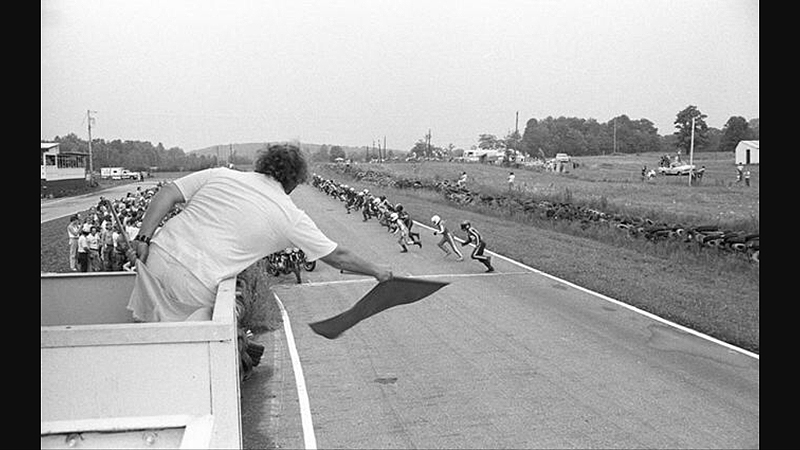
We should mention that Lang
Hindle was the initial
development rider and was responsible for us raising the Z1 engine in
the frame to get more lean angle after testing at the Nelson Ledges 24h
where
we scraped the cases below the oil sight window. Lang was chosen as he
had a history of going fast. Damn fast. Lang put the bike into the lead
and lapped the entire field. Faster than TZ 750 on the Behn
Monoshock...1:14 lap times at Nelson Ledges...over 40 years ago.
At the first rider change
the 2nd pilot crashed the bike...Sent him home. We ended up running
around 18 hours and then pulled the engine to put the motor in a bike
that had an engine failure. We found we could out-handle and outrun
anything.
Bol D'Or 1977 250,000 Spectators
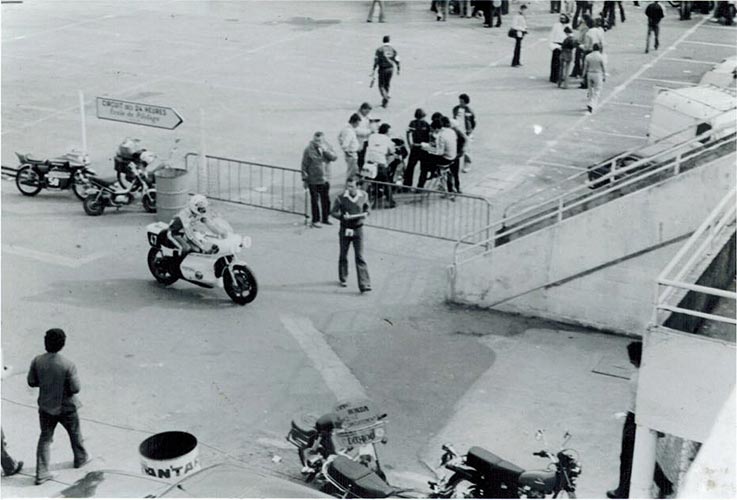
We should also mention
that Lang went to France with us and crashed on the first lap of
practice and was immediately sent home. Idiot. Lang's excuse "Cold slicks". Everyone
had cold slicks.
Above: Lang leaving for the lap he did not complete at
the Bugatti Circuit, Le Mans. In 2015 Lang called us up to clear the
air a bit. We like Lang but are still pissed four decades later.
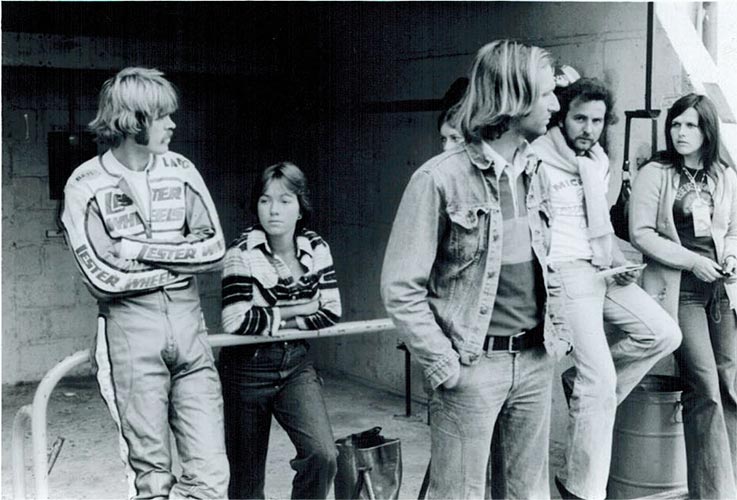
Lang and Bob, the designer
of the bikes and organizer for the race effort, in our pit at Le Mans.
There is only one cook in the kitchen.
It should be noted that Lester Wheels had nothing to do with the effort. We ran magnesium wheels supplied by Elliot Morris of Morris Wheels. Elliot was a huge help, a true engineering pioneer. Elliot was, in a past job, an engineer at Packard. At his suggestion we ran Kawaski LTD cush drives on the rear magnesium wheels to prevent the bolts from tearing out.
Zero participation by Lester. Period.
Nos Pilotes
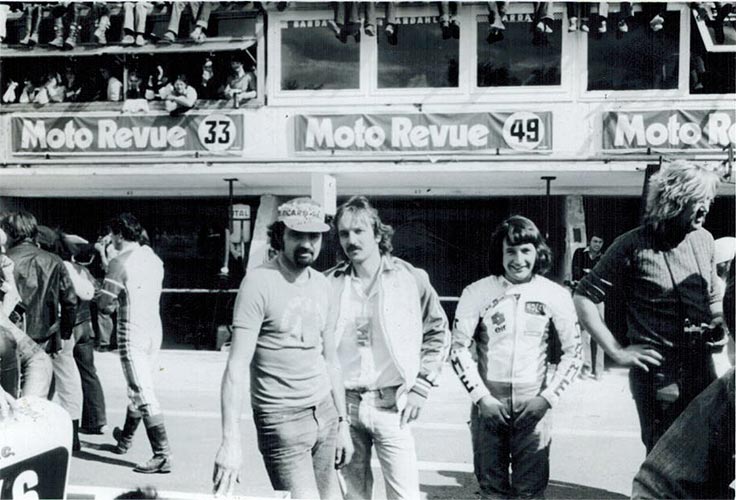
Our Swiss and French pilots...Gilbert Piot not in the frame. Riders were: Roland
Freymond, Gilbert Piot, Jean Paul
Chaubert, Francis Erard. All professional. All known quantities. They
came on our say-so, took care of their own accomodations and asked for
nothing. Try that these days. Passion.
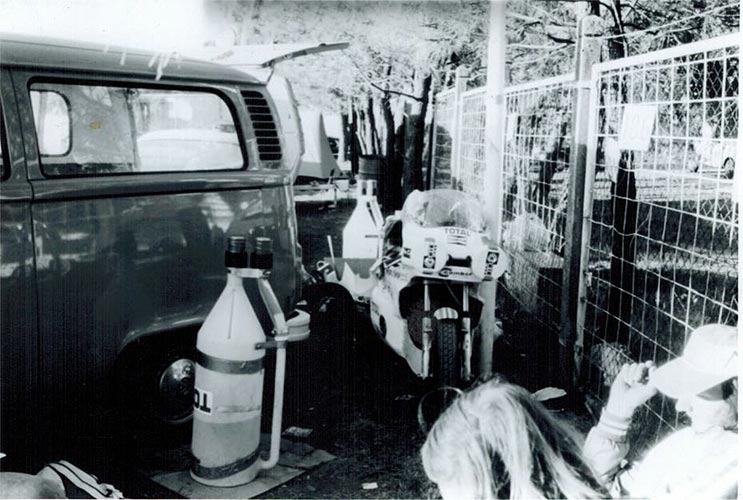
Here you can see one of our
Bol d"Or rental vehicles, the second being a small Ford Escort. Two of
the Hunsaker USA quick fills are visible that we fabricated with the
large Induction Systems valves supplied by Dave Ayers. This was five
years before Gordon Murray utilized quick-fill as a pit strategy.
A little known fact is that
Gary and Lang drove the bikes from Charles De Gaulle Airport to the Le
Mans Race Track. Open exhausts, no passports, no valid registration, no
money for toll booths, no helmets, and phony Texas license plates.
Wheelies for the French Airport personnel after they filled our gas
tanks with free Avgas when we uncrated the bikes out of customs. Try
that again. Vive La France.
Necrology/ Post Mortem
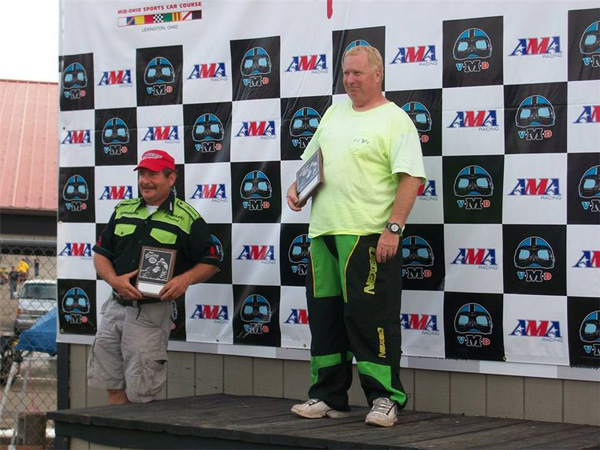
Over the last 40+ years (1977-onward) various racers who
raced our Monoshock bikes have contacted us like Sam Williams (above), Gary
Gates, Charles Finney, Ralph White and Ed Hileman. Pretty good memories and some
victories
to talk about. Various people have surfaced here and there with saying
they had some connection to the racing activities. If your name isn't
one of the above paragraphs then you sat on the sidelines and
didn't go out on a
limb like we did. People have used photography that we took to infer
they were places they never were...like at Willow Springs where Lang
Hindle and Gary Gates did testing...and where we ran around the track
unsupervised when they left us to our own devices.
Sam Williams (above) called us up before he died in
2014
looking for parts for his Behn Monoshock. We told him that was ancient
history. Sam
went to France with us, not as a rider though. He did win 24 hr races
on our Monoshocks however. Cancer got him at age 69. We asked him if he
had stopped drinking...he said he had and he felt a lot better. Once,
while assembling a Monoshock, Sam asked about the weight of the control
levers...We threw his hamburger in the trash as a weight saving measure.
Nelson Ledges was his home track where he raced with his #47. When he wasn't racing Kawasakis and winning races he was popping wheelies in Mack Cement Trucks.
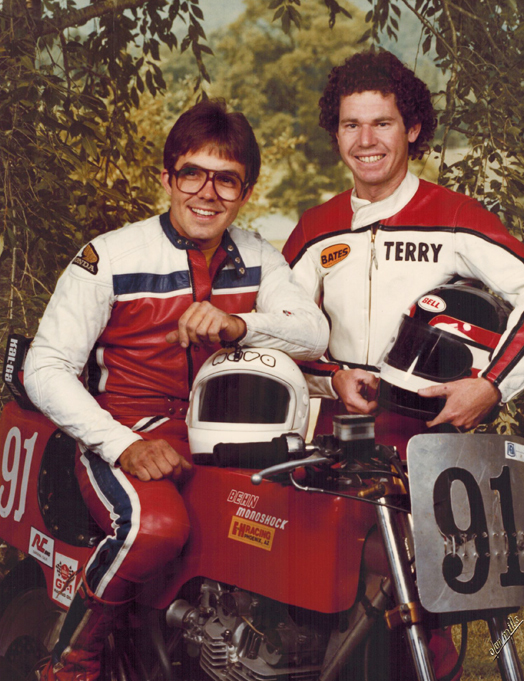
Ed Hileman and Terry Statum
Our friend Gary Gates (picture below) welded up the
frames for the Bol D'Or race bikes...no one else. No one. Of the two
bikes that raced at the Bol D'Or one returned to the USA and was raced
and won 24 hour endurance races. The second bike was left with Gilbert
Piot in Switzerland...a friend of ours who put together the team of
Swiss and French riders who rode the bikes. Carlos and Kari Mestre got
the trailers to the race track for the crew.
There are a few of these bikes and frames still
around that we sold
after the race. After the 1977 Bol D'Or there was an attempt for those
peripherally involved to copy the frames and take over the project.
Guess what...no one knew how to do it, including those who had raced
them. Little things like gas tanks, fairings, seats, shock abosorbers,
compression and rebound ratios, custom shock springs, forks designed
and custom made in Italy after visiting the factory there, molds,
wheels,
brakes, exact geometry and a myriad of details were suddenly lacking.
One or two were assembled post Bol D'Or that did not come from RB
Racing.
One fabricator welded up a copy frame with silicone bronze and the frame came apart (not one of ours). Another welder was called in to copy the frames while we were in France and the front to rear track was off 9/16" as the steering neck was not perpendicular to the centerline. We were asked to straighten that out when we got back from the Bol D'Or but we declined.
Glory is a funny deal. Everyone wants to bask in it,
rewrite history, and claim credit for what they never did. They did not
design the parts, race the parts, assemble the bikes nor ever even ride
or test the bikes...A 165 mph blast on Interstate10 with no license
plate, and a wide-open exhaust taking the bike back from getting the seat
upholstery made. Endless 20 hour days and, at one stretch, 5 days
without sleep to make a race. Funny how people who said they were there
actually weren't, either for testing, or racing. Small people grasping for ancient glory they had
little to do with three decades plus after the fact. If you did not go
to the fire and feel the flames,
hide in the shadows
where you belong.
In racing and business there are the innovators, the
racers, and the risk takers. The rest are bench warmers, armchair
experts or simply the hired help.
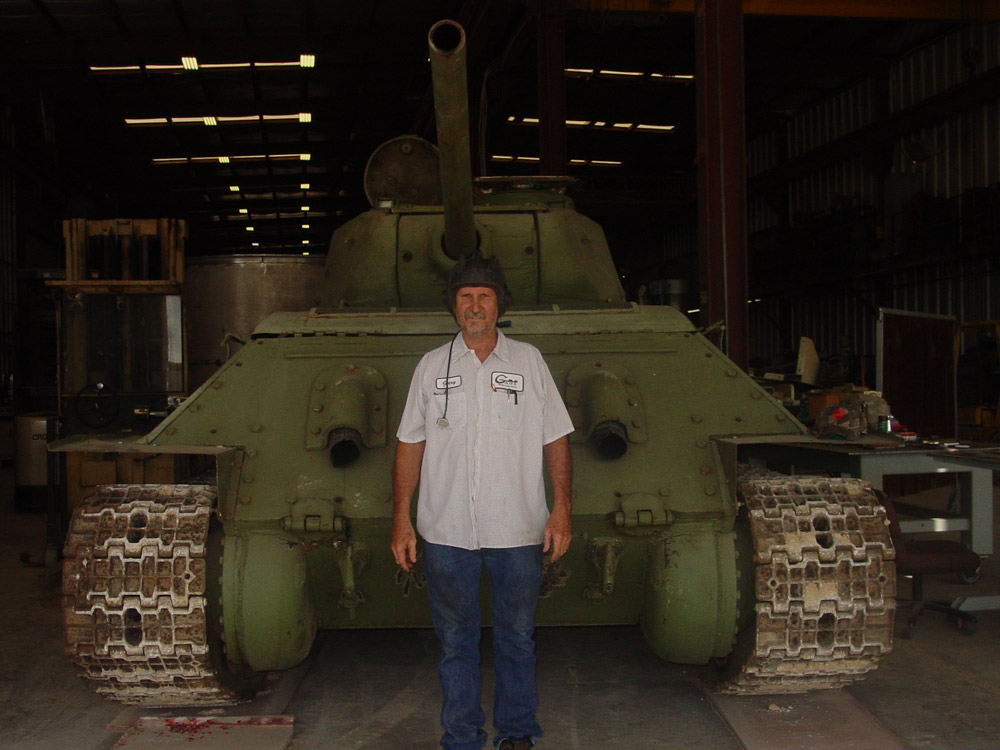
Here's Gary Gates circa 2012, some 35 years later, with the 1944 T34/85 tank he bought for his Texas-based tank corps, headed by Commanders Sacha and Nicoli. Gary still races XR750's and Nortons. Some people on this earth are worth staying in touch with...not many. Gary is the real deal. Gary welded up the frames for #'s 46 and 47 race bikes and went to France with them. Gary went around the pits and not speaking a word of French came back with a replacement windscreen for one that we broke. Gary.
Charley Finney 35 years later
35 years later Charley Finney sent us 9 pictures from his winng racer at the 1981 WERA Pocono 6 Hour.
Charley writes:
"I came across these and thought you might enjoy them. The pictures were taken spring of 81 and the race was the WERA 6hr at Pocono International. We took overall. It was a product of its day, but it was a nice tool for the job. Thanks, Charlie Finney"
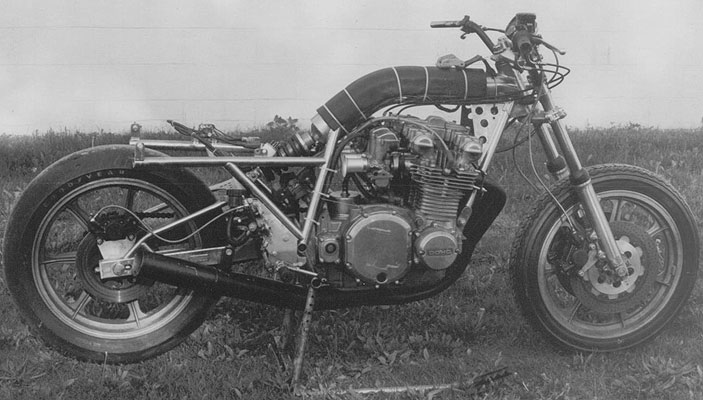
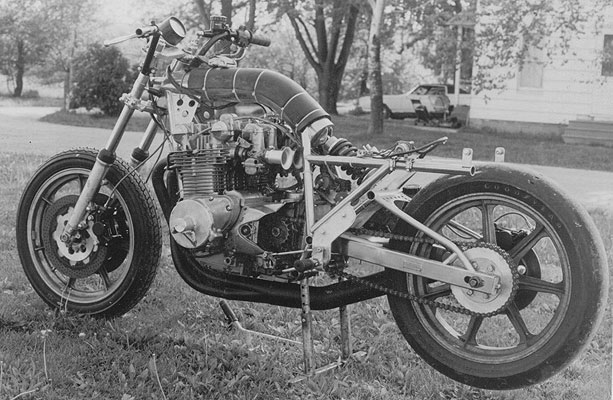
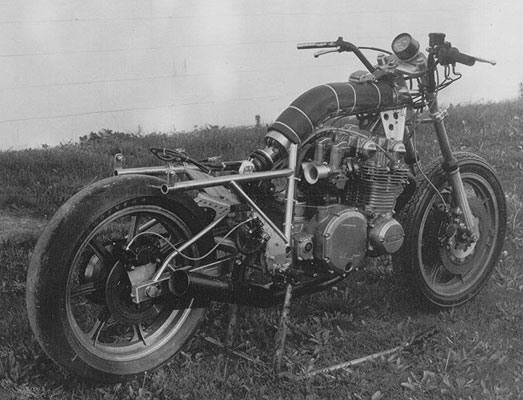
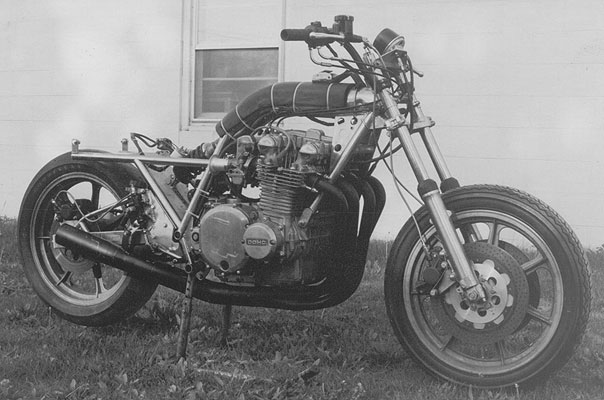
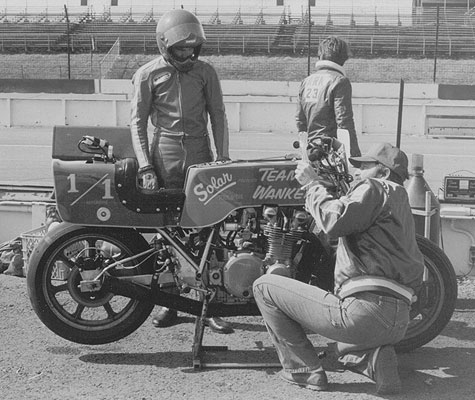
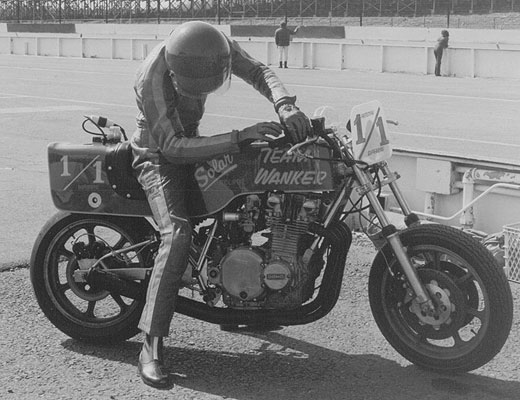
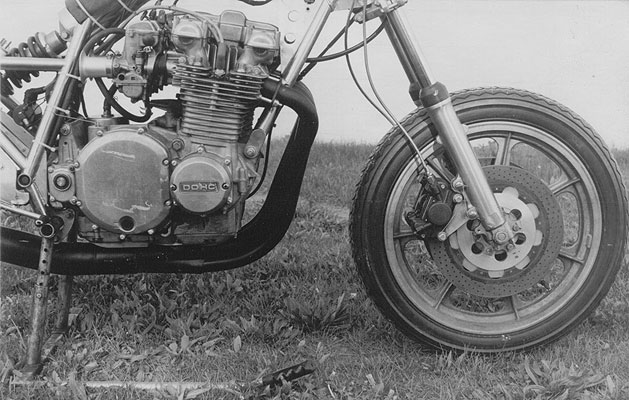
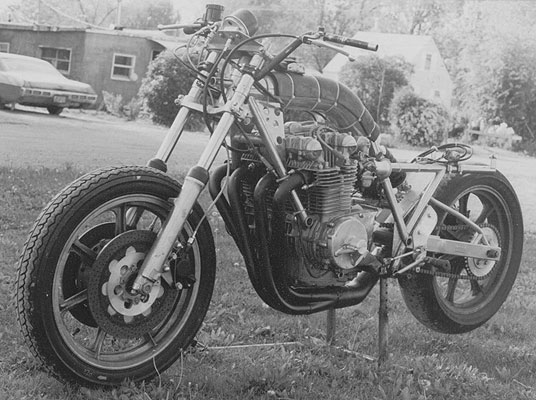
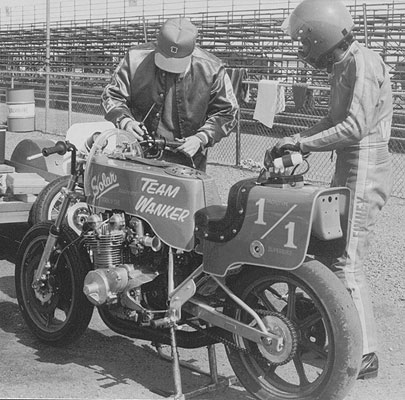
Behn Monoshock Chassis - Click on photos to enlarge
These are the Behn
Monoshock bikes and chassis that we designed, raced and marketed. There
was an attempt while we were in France at the Bol D'Or by Joe Miller of
Tri-Mil Industries to make copies of these (he failed). Joe signed on
as a sponsor but bailed before we left for France.Various team members
of the Bol D'Or effort tried to call the bikes Tri-Mil bikes later on
even though they bought them from us as they thought Joe Miller was
going to be their Sugar Daddy to keep racing. Joe was no one's Sugar
Daddy and those efforts went nowhere.
To see the catalog we offered in 1978 when we were selling the chassis kits we offer this webpage
When the bikes were
protested,
the race organizers, like Dr Peter Frank in the WERA, called us to
verify the
chassis could be purchased by anyone.We parted ways with Joe Miller
although, in a strange way, we sort of liked Joe and he liked us even
though he stole all our personal possessions like Leica cameras not to
mention his aborted attempt to take over the Behn Monoshock project.
Joe came by RB Racing ever so often up until his death at age 70 from
alcoholism...pretty much genuinely concerned how we were doing. Joe was
sort of famous for his Tri-Mil Bobcat VW exhausts, a prototype design he stole
from another Speed Equipment Company and put into production before they did.
Anyone who tries to call a
few chassis that were floating around "Tri-Mils" simply knows nothing
about the history of the project...which actually started in 1972-1974
, years before the Bol D'Or, with trips to Northern Italy to secure
supplies
from Grimeca and Ceriani...plus the help from the race department at
Amortiseurs DeCarbon in France. Visits to Danielle Fontana and the
importation of supplies from AP Lockheed. Discussion with an existing Bol
D'Or winning mechanic (Godier-Genoud) in 1974-1975 as to what were the weak points to look for in a
24 Hour race with Z-1 motors...the same people we supplied their #60
oil impreganted Diamond endurance racing chains to (used in Grain Elevators).
People like the late Elliot
Morris of Morris Mags who supplied magnesium wheels and loaned us his
van to cart the chassis around in. Randy Hall of Kawasaki USA
Racing who provided internal parts for the Z-1 Motors, and Jerry Branch
who prepared the cylinder heads... Dave Ayers of Induction Systems who
sketched out a quick fill suggestion on a napkin in a coffee shop at
LAX. Jerry Greer of Camber Fairings who made the molds and who made
the fugliest 8 gallon gas tank ever seen that we redesigned into the
one you see on the bikes. Hunsaker USA who custom made the clear plastic
NASCAR style quick fills that we adapted to Dave Ayers large quick fill
valves. Bob Gorsuch of Excello Plating who provided particle inspection
of rods and crankshafts.
Even Byron Hines, who worked for Russ Collins,
who we called on a Sunday at home to get him to have someone open up Arias
Pistons so we could get our pistons...and Russ Collins of RC
Engineering who told Terry Vance to give us whatever we needed for the
project. Russ pulled out all the stops.
If you weren't there for any of the above you are a four-flusher wannbee, not a racer nor a designer. Get a life. Find some other coat tail to hitch on to.
There are times in history when you can be ahead of the curve but these evaportate with time. We moved on to get ahead of the curve again in other areas like tubocharging and fuel injection. Be prepared to change as it is a constant. Buggy whips and coal fired power plants.
A few times each year, some
40+ years later, someone will call up wanting to "Restore one of our
Bol D'Or chassis". We sort of impolitely tell they weren't there for
the show...Only two chassis were raced at the Bol D'Or and they are
long gone...And that we only talk to people who were involved, many of
whom are dead at this point. There are no parts. We were there for the
history, standing on the line at Le Mans, with the American Flag
flying...and with the accompanying PSD racer's syndrome we are just not
going to talk to you about it.
More 1980s Photos...Howell Photographic Arts
45 Years Later
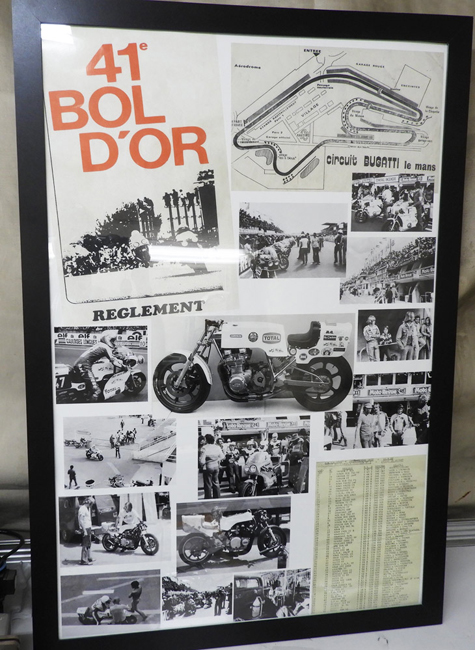
2022: Gary Gates went over
to see someone who had one of our old Monoshock Race Chassis and
realized he did not have any mementos from 1977. We sent Gary some
Black & White photography and support material from the 41st Bol
D'Or. Gary had several 24 x 36 posters made up and sent us one. The Bol
D'Or was, in large, due to Gary's hard work. Lower right is qualifying
order before the start.
Post 1977 Bol D'Or
1978 Began production of Harley Davidson, Japanese and BMW exhaust systems.
1979 Built first turbo kits - 150 hp Harley Davidson Shovelheads and Japanese 4 cylinder SOHC Hondas.
Developed Shovelhead Turbos with SU draw-through
carburetion. Designed SU Turbo needles. Mel Magnet of Rivera wanted to
sell the kits we developed. Said he wanted "100 kits", and, after
receiving the first
batch of 25, decided to copy them...We got a call from Woody Harrah at
PaceSetter saying Rivera Engineering had sent over some parts to
copy...Woody sent the turbo header over to Kas Kastner (Nissan Race
Director, Sailor, Turbo Guy) as he did not want to mess with it. We
called up "Kaz" and went by to see the parts..They were ours. Told Kaz
to go for it.
As Mel told us at the time, when we forced him, locking him in his office in Whittier to collect what he owed, "You just don't understand how the business works"
Mel then went off to rip off the Belt Drive business.
After two years Mel
came back to us and said "He had made a mistake about trying to rip us
off and wanted to work with us again". He delivered his Shovelhead
Superglide to us. We tore it down into 100 pieces, told them we were
making good progress when they called and, later on, told them to pick
up the bike...In 100 pieces.
Mel passed away years later. It was
very clear how he understood business...Starting when he ripped Carl
Morrow off in the SU Carburetor business and exited his TV repair shop to start Rivera Engineering.
1979: Imported brake systems from Europe selling to US wheel manufacturers and race teams.
Turbos: At various times in the late 1970's and 1980's built
Turbo Kits for Honda CB750 SOHC/DOHC, CBX, CX500, CB1100, Kawasaki Z-1,
KZ650, KZ550, ZX10, ZX11, Yamaha V-Max, XS1100, XJ550, BMW K1002V, K1,
K75, K1004V, R100, R1100S, R1100RT, K1200LT, K1200RS, Triumph Triples,
Triumph 1200 Daytona, Harley Shovelheads, Big Twin EVOs, Sportsters,
Buells, V-Rods.
1980 Began producing BMW turbo kits and exhaust systems for BMW distributor. Built last monoshock chassis. Ran Kawasaki turbos (street) 9.40 @ 148mph.
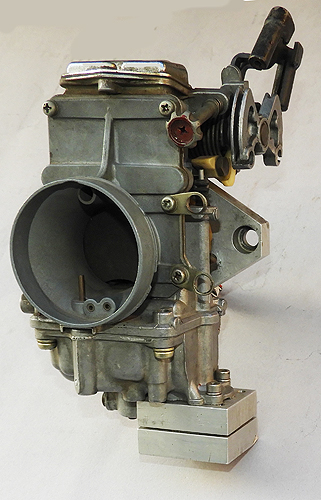
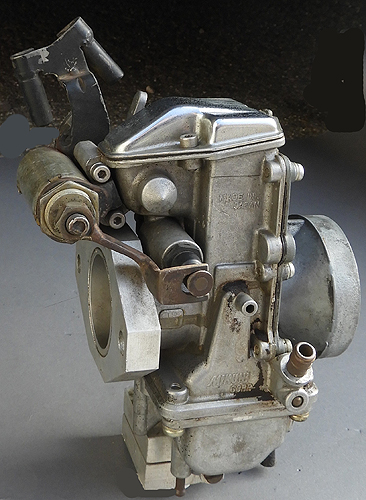
1982-1984 Developed special
"PowerMaster"carburetor for Harley-Davidson motorcycles. We were
looking for a carb to sell to the Harley market and Dan Ford who was
working for us found a 38mm casting on the shelves at Mikuni American
Corporation...It was off a motorcycle not sold in the USA. We made a
deal with Mikuni Japan to import several hundred of them for $70.00
each and then began development adding a larger volume accelerator pump
we made and converting the castings from spigot over to flange mount,
plus making up custom throttle cables and inlet manifolds.
Mikuni American Corp i.e Kay Nishi, Lee Chapin, and
others decided we might be onto something, so they demanded one for
testing. After their testing they requested a meeting where they told
us we were no longer needed as they were going to copy our work. We
then said "Go right ahead...because what we gave you is not what we
plan on selling". We then showed them our "new" version. They went back
to Japan and Mikuni Japan said the revision we did was too expensive
and to let RB Racing sell the carbs. We did for awhile, then Mikuni
American Corp raised our prices from $70.00 per casting to $140.00 per
casting.
We sold what we had, junked the rest, tossed $2,000.00 worth of cables in a dumster and moved on. At one
point we even developed an automatic enrichening circuit with a
solenoid and a snap-action thermal switch.
Keihin Corporation was aware what we had done for
Mikuni so they asked us to develop the 41mm FCR Carb for the Harley
market. We did...achieving 54 mpg and doing 8000 ft altitude tests as
well as odd tests like 45 minute idle testing leaning the bikes to the
left and right for both Shovelheads and later on for the first EVOs. We
suggested to the Keihin engineers that a 45mm FCR would be required for
the larger motors...They said the tooling to do so was out of the
question.
The 41mm Keihin FCR project was then turned over to Sudco Corporation and lingered with
them for years. They changed our jetting and needle
specification...ending up with 36 mpg. Go figure.
Mikuni Corporation then asked us to do development on their 42mm Carb for Harleys which was originally tooled for the inline 4 cyl market for V&H. We declined. Good Reason to do so.
Onward
1985
Returned to Bonneville 27 years later with Harleys and Suzukis. Built
blow thru carb fuel systems and inlet breather/blow off valves for turbochargers.
Introduced first blow-thru turbos
for Harleys. Built the World's first intercooled fuel injected
motorcycle with our BMW K100 Turbo kit...some still running 25+years
later.
1987-1988
Developed specialized carburetor calibrations for CV carbs..ran
GSX750's in the 10's and GSXR1100's in the 9's with stock engines.
Began fuel injection development program., First Blow -Thru the carbs
intercooled Suzuki Turbo. Engineered mechanical turbo scavenge systems for low mount turbos.
1989 First fuel injected Harley. First Fuel Injected Intercooled Harley Turbo. Suzuki GSXR Turbo runs 187 mph at Bonneville wirh rear wheel going 237 mph (aero pig).. Expanded BMW Turbo kits to include newer models.
1990-1992 Suzuki Turbos/Harley Turbos set 200 mph Bonneville speed records--all fuel injected and intercooled. Introduced AIC (Additional Injector Controllers) for use on fuel injected bikes and cars. Sponsored two separate motorcycle streamliners in Bonneville speed records - BMW and Harley powered. Worked extensively and crewed with Bob George's 2nd generation Nitro Burning, Double Engined streamliner. Bonneville and El Mirage records set with both streamliners as well as BMW, Harley, Suzuki RSR Fuel Injected Turbos.
On BMW turbo K100 206 mph El Mirage bike employed our
Eight Injector RSR Fuel Injection, Water Injection, Intercooler spray
bar, and fuel cool can. Repoed the parts after the record was set. 5
days work just making the stainless 4-1 turbo manifold for that
one..plus worlds first nose mounted ice cooled intercooler.
See Bob George's double-engined Harley streamliner
at Bonneville in a new video. Get an idea of how complicated these
nitro burning missles are. We worked on this one for several years
before it was retired and sold in the 1990's. We drove Dave Campos'
Suburban to chase him down the course and disarm the fire protection
system...Dave getting a soft 200 mph record. Eddie the Eagle went along
for the ride. We kept Eddie. Lots of stories with Bob George and his ex
Roberta.
Bob George went broke
squandering an inheritance running the Millenium Falcon...Bonneville insanity kills everything in it's path.
1992-1998 Continual racing at Bonneville/El Mirage/Muroc resulting in seven 200 MPH Club Speed Records. Developed new turbo systems and exhaust systems for Harley Davidson and continued testing with customers on Fuel Injection on 11 different types of motorcycles as well as automotive and marine applications. Introduced AUTOCAL Fuel Injection Software. Built the first intercooled BMW R1100RS turbo kit which ran a 10 second quarter mile.
Innovations: Closed loop efi produced in-house; Nose
mounted intercoolers, computer controlled water injection, first fuel
injected intercooled Harleys, Triumphs, BMWs, Suzukis, Kawsakis etc.;
Cool cans for fuel on turbo race bikes, intercooler spray bars...records set at Bonneville, El Mirage, Maxton,
1999 Introduced new Blackbird, Pro Street and Pro Gas Harley Turbo Systems. Expanded exhaust system line to over 200 applications. Introduced revised AIC 400 to the automotive market for supercharged/turbocharged applications. Developed new Black Hole muffler systems for cop-evading high speed runs.
Introduction of 113" ORCA RSR Fuel Injected Motors. New 500hp capable BoostMaster wastegates integrated into all turbo kits. Completed 5,000 mile year-long test of new Harley "Blackbird" 250hp turbo with zero problems. RB Racing turbos dominate AHDRA/SCTA events.
2001 One year of
designing and testing new BMW K1200RS/LT turbos. Designed new 113" ORCA
turbo pistons. Expanded Harley
Davidson exhaust line to 300 part numbers.
2002
Began production of older BMW K100 and R1100RS Turbo Kits and updating
existing kits. Set up a large separate R&D Facility for testing,
engine assembly, prototyping and installations. K1200 series BMW forged
turbo pistons tested in K1200RS and LT models. Land Speed 200 mph
records set with out ZX-11 Turbos running 221mph in the mile with out
RSR 8 injector system.
2003 Completed testing of new Black Hole exhaust systems. Launched new Bonneville project based on 132 cubic inch ORCA motors. Expanded exhaust system line to include LSR Black Hole 2-1 Harley exhausts. Launched new polished silver ceramic finishes. Developed new water injection system for high output street and racing applications.
2004 Continued development of Black Hole Exhausts with introduction of BMW R Series exhausts and fuel system upgrades. New solid state digital instrumentation developed to replace troublesome analog and liquid filled gauges. Introduced new RSR EFi systems with new billet enclosures and 40 pin waterproof connectors with gold-plated contacts. Finalized designs of 139" Turbo ORCA motors. Introduced BMW R series turbos.
2005 Introduced new Harley LSR 2-1 Pro Stock Challenge systems which win AHDRA championship in first year. Redesigned Harley Turbo systems with larger intercoolers and both center mount and left mount turbos. New RSR ECUs enter competition setting records.
2006 Designed new Twin Cam Dyna exhausts and introduced new 113", 126", 132" and 139" ORCA motors in both Twin Cam and V2 configurations. Installed new production and test equipment to include an eddy current dyno. New BMW turbocharger systems designed. Expanded turbocharger applications for Harley big twins both oem and custom as well as race versions.
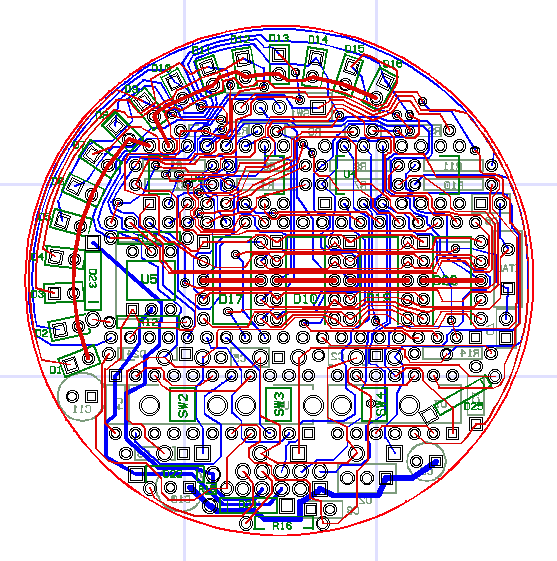
2007: Readied introduction of solid state instrumentation packages. Fabbed up new 500hp turbo configurations. Purchased new CNC equipment to introduce new, sort of unusual, products. Continued a 6 year support system for Nitro burning Harley Top Fuel and Pro Fuel projects. Bonneville Bullett nears completion.
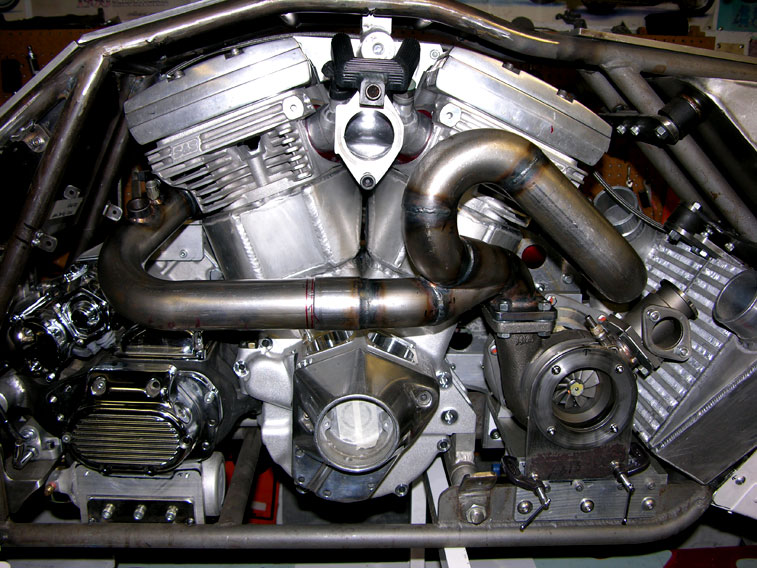
Mike
Geokan's Bonneville Bullet nears completion as a testbed for new
RB Racing technologies. Salt Flats in 2007 were wet and less than ideal. Follow Bullett's progress
as we gear up for 2008. The RB Racing's involvement ended in
2017...zero to a soft 200mph record in three years. In 2017 Mike showed
his ugly side, so we departed.
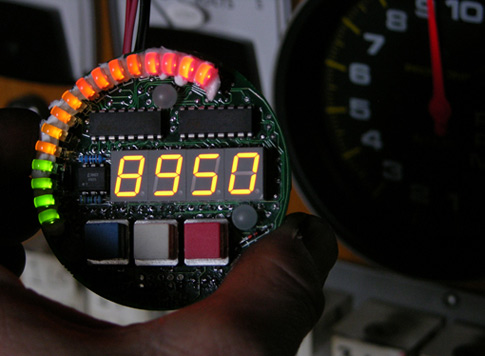
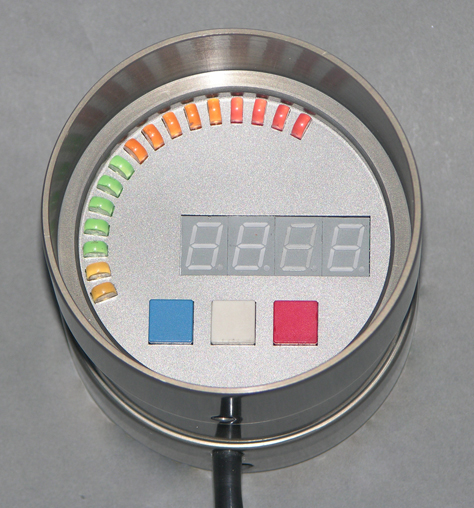
Completed ORCA Tach projects and went into final test of ORCA Turbo Dash project, pictured below. Also completed ORCA GPS Speedometer and tested it at Bonneville.
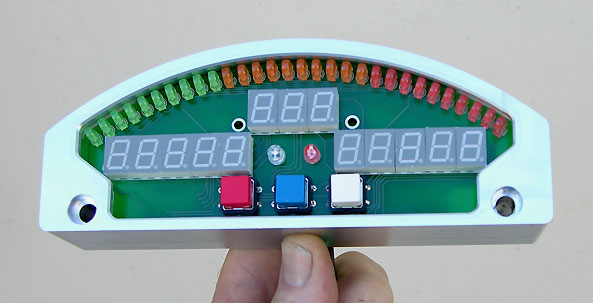
Continued funding of a Caltech Physics student.
2008: Flat out completion of the Bonneville Bullet project ending in first test runs at Bonneville in August of 2008. Starting producing digital gear position indicators.
2009: Graduated a Caltech Physics major now headed for a 5 to 7 year Doctoral Physics program. While we grab the twist grip and go past 200 mph others use particle accelerators at 99.99% the speed of light to study gluons and quarks. Someone always has more expensive toys than you do. Qualified the Bonneville Bullet for long course at Bonneville at the 2009 World Finals with Bryan Stock taking over for the injured Mike Geokan.
2010:
Expanded operations 100% and purchased more CNC equipment to build a
new range of high performance products. Stripped the Bonneville Bullet
down to ground zero in preparation for 2010/2011 record attempts. Upgraded dyno operations with a Superflow Dynamometer.
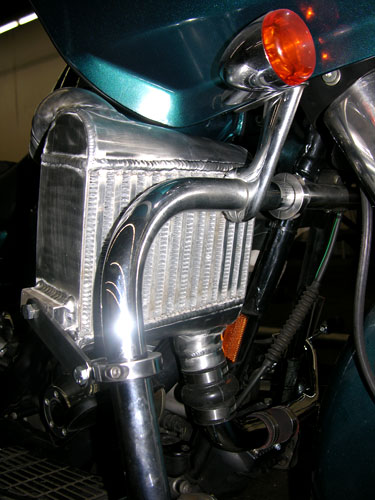
2011:
Introduced new Harley Turbo systems aimed at FLT/FLH Baggers featuring
360 hp turbos with large intercoolers.
2011: Made two trips to Bonneville and picked up a 200 mph record on the Bonneville Bullett with Bryan Stock doing the driving chores.
2012: Introduced new LSR 2-1 RaceCat exhaust systems marrying our race winning Pro Stock exhausts with a clean burning catalytic converter to drop the Db a bit. Finished a 10,000 mile test of our new Harley Turbos and started development of our 360 hp Road Glide. The Bonneville Bullet began it's next stage to the upper 200 mph range with upgraded high-end Cosworth electronics, beta tested on our own "Road Toad".
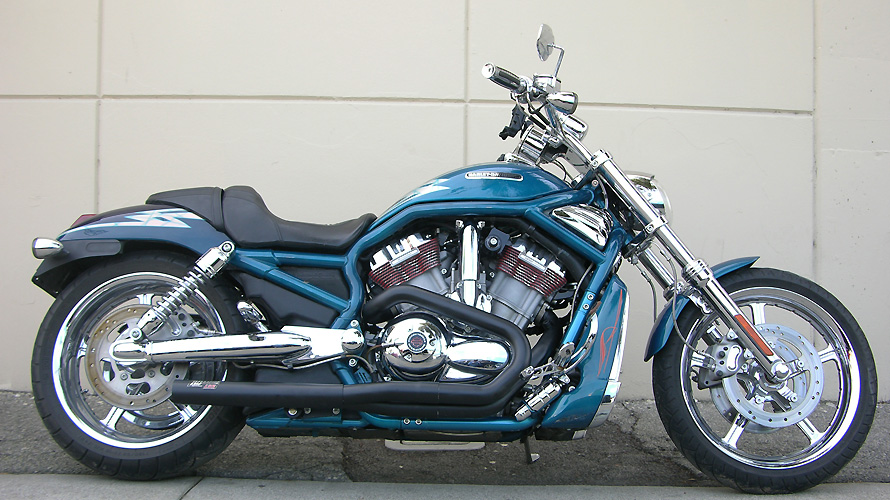
2013: Testing with ORCA motors and Cosworth Pectel SQ6M electronics for the 139" Bullett and our 126" Road Toad. Also designed new V-Rod exhaust and turbocharger systems.
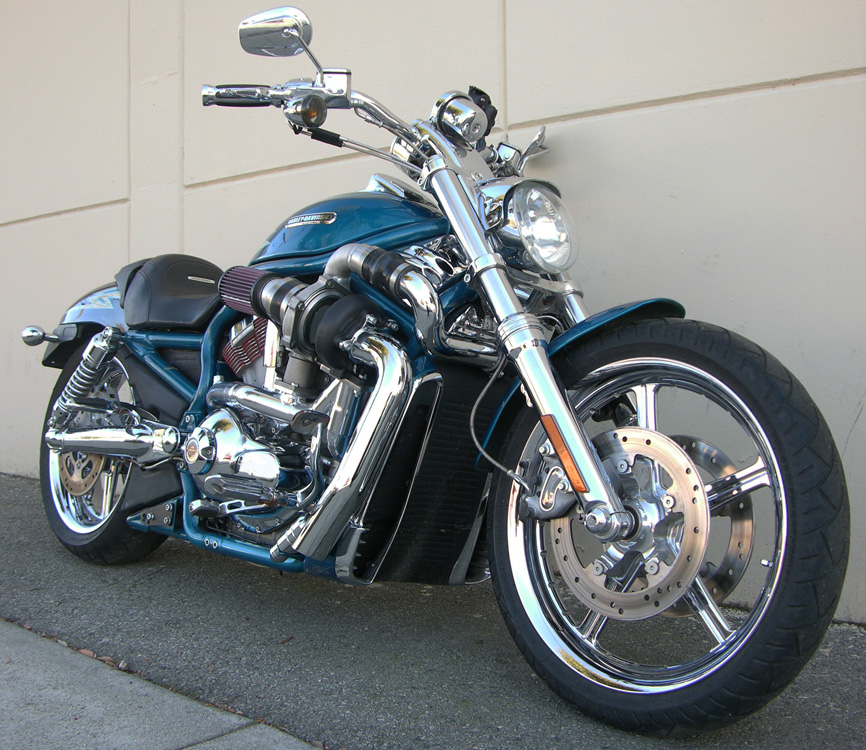
We also designed new
1000psi water injection systems for our turbocharger systems. Super
fine atomization is the key to more power and no detonation at high
boost levels...like 535 hp Harley Turbo Orca motors.
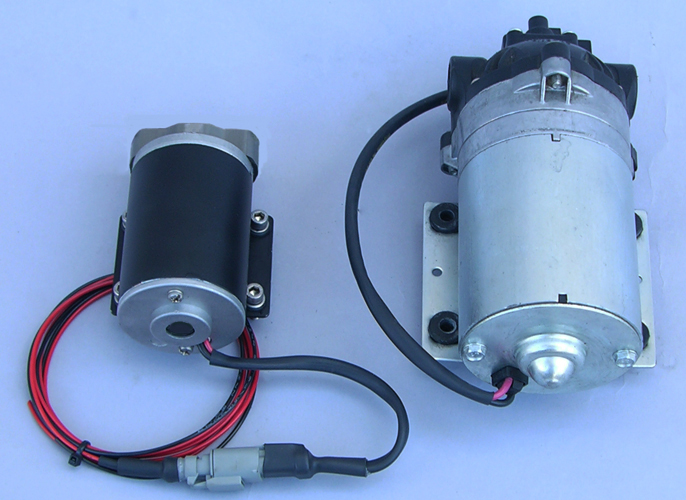
2014: Revised our BoostMaster wastegates and continued development of advanced turbocharger control with Pectel SQ6M engine controllers. We machined up billet mounting systems for Pectel SQ6, SQ6M and SQ6M12 engine controllers and began shipping these out. We converted our Bonneville Bullet and test Road Toad to Pectel Fly-By-Wire control which is quite complex. Carl Pelletier updated our 139CID Bullett ORCA Motor for racing in 2015 (2014 was rained out) and we installed a new mil-spec wiring harness on the Bonneville Bullett for the Pectel SQ6M with 49 outboard connectors and sensors.
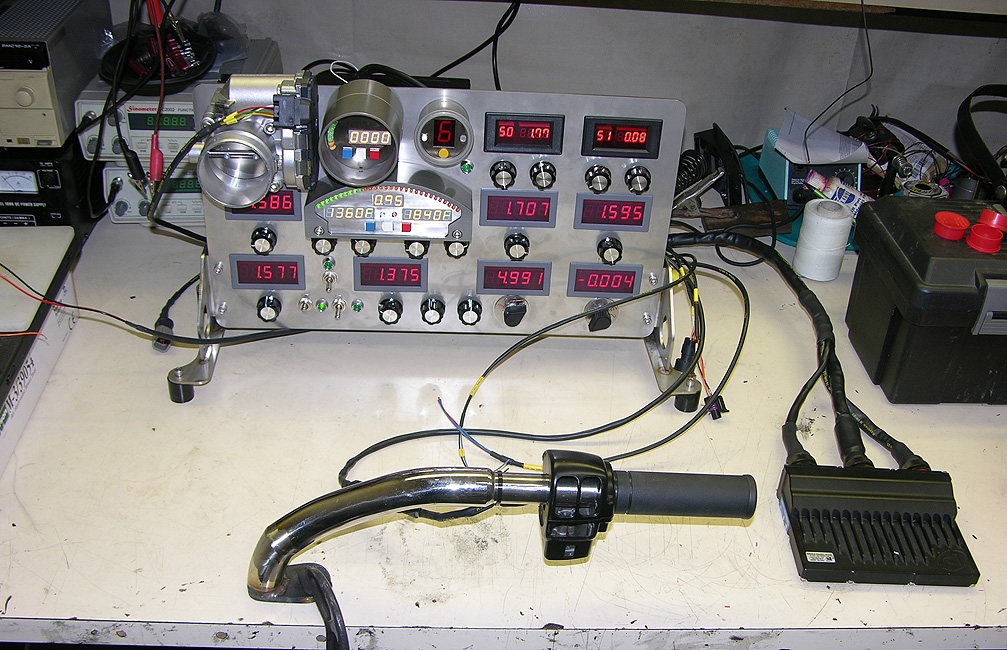
2015: Kept up work on advanced electronics calibrations for our Bonneville and test projects. Built a simulator for the Pectel SQ6M Controller
2016: Prototyping of new
Indian Scout Exhausts. Student finishes 23 years of schooling with a
PhD in Physics...he does not know what a Crescent wrench is.
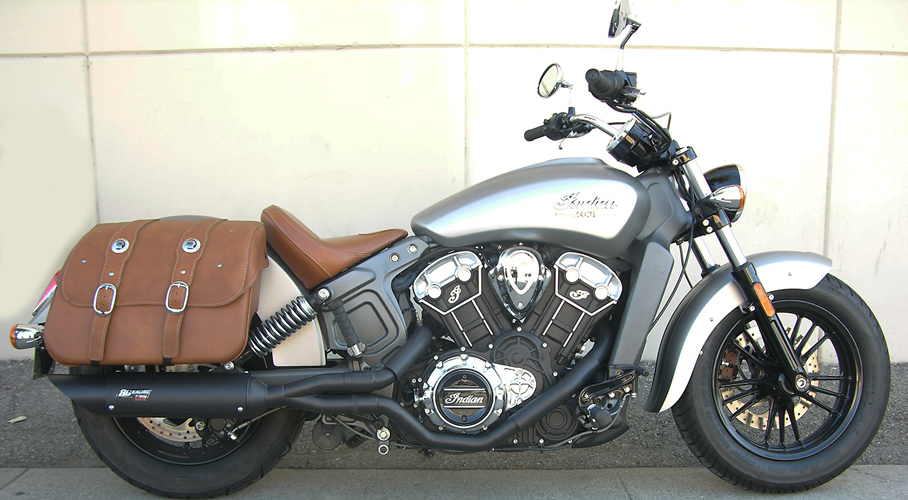
Shit! We forgot to take a vacation.
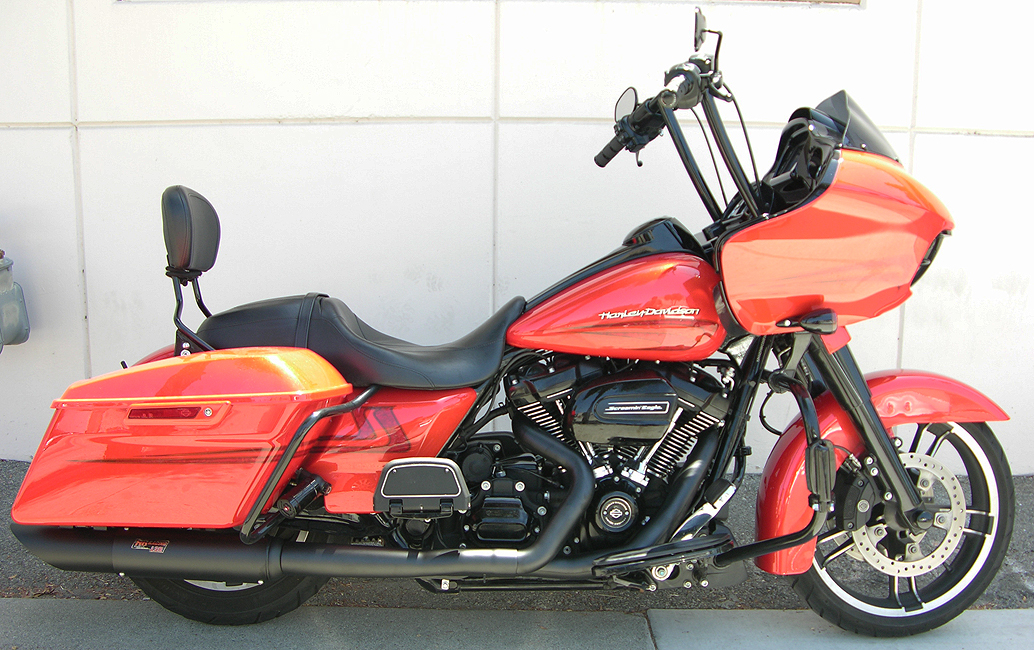
2017: Harley comes out with the new M8 motor and we tool up for a variety of LSR 2-1 exhaust systems. Here is a 2" LSR 2-1 Pro Stock Spyder exhaust 00-1396 in Dual Coat Black Ceramic. New 2018 Softail M-8 exhausts prototyped.
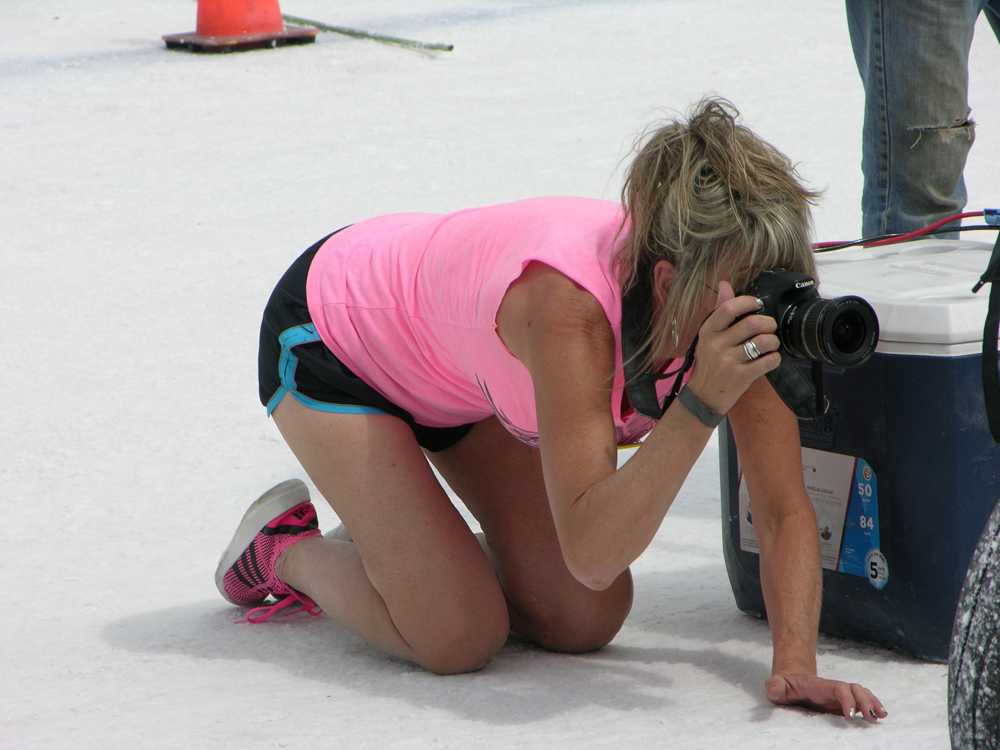
2017 SpeedWeek: Diana
Sterk is busy documenting the scene at SpeedWeek. The
below link is Diana's photography of 2017 SpeedWeek. Diana has varied
photographic interests...old cars, hot rods, bikes/bikers, musicians,
bands, nature, the homeless, and others. You can purchase her photos by
clicking on the link on that page.
Diana
maintained a Facebook page for us for two years but we asked her to
shut it down in 2019... Time to move on as we closed out our Bonneville
support in 2017. Politics and egos. We funded her trip to Sturgis in
2018 as a final "Thanks" for all the effort she put in...then adios.
https://photography-by-diana.smugmug.com/Bonneville-Salt-Flats/Second-Folder-2017-Speed-Week-/
https://photography-by-diana.smugmug.com
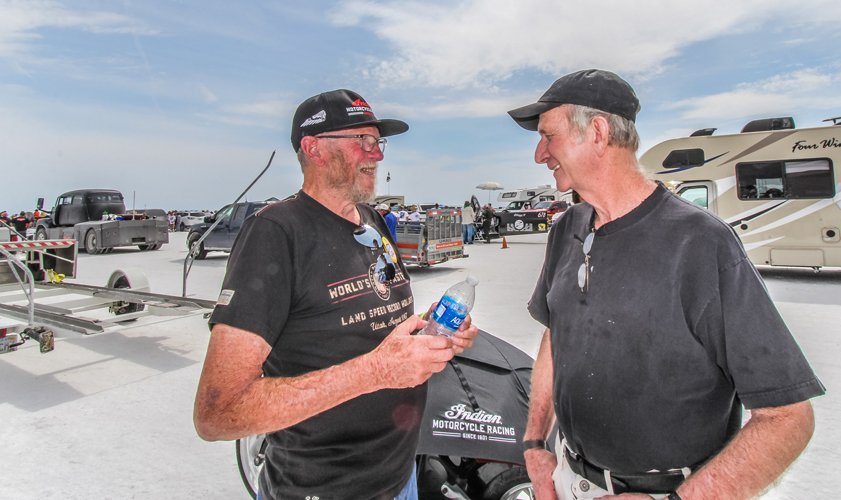
2017 SpeedWeek...Diana
Sterk was palling around with Burt Munro's son, introduced us to him,
and we got to exchange
lies and tall tales about motorcycles. His tall tales were better..like
riding
through town in New Zealand at full throttle standing on a motorcycle
seat running
all the lights all the way to the harbor.
We countered with a 1985
story about exiting the salt on a twin turbo Suzuki going 135 mph back
up the access road and then realizing we had no brakes and a 90 degree
left hand turn was coming up. Of course we died...Plus financing a trip
to visit the ladies in Wells.
Crazy as his dad. Stories about Ed Iskendarian and his father and many others. We asked him if he worked his way over on a tramp steamer..."Yes at 30,000 feet". His stories were definitely better.
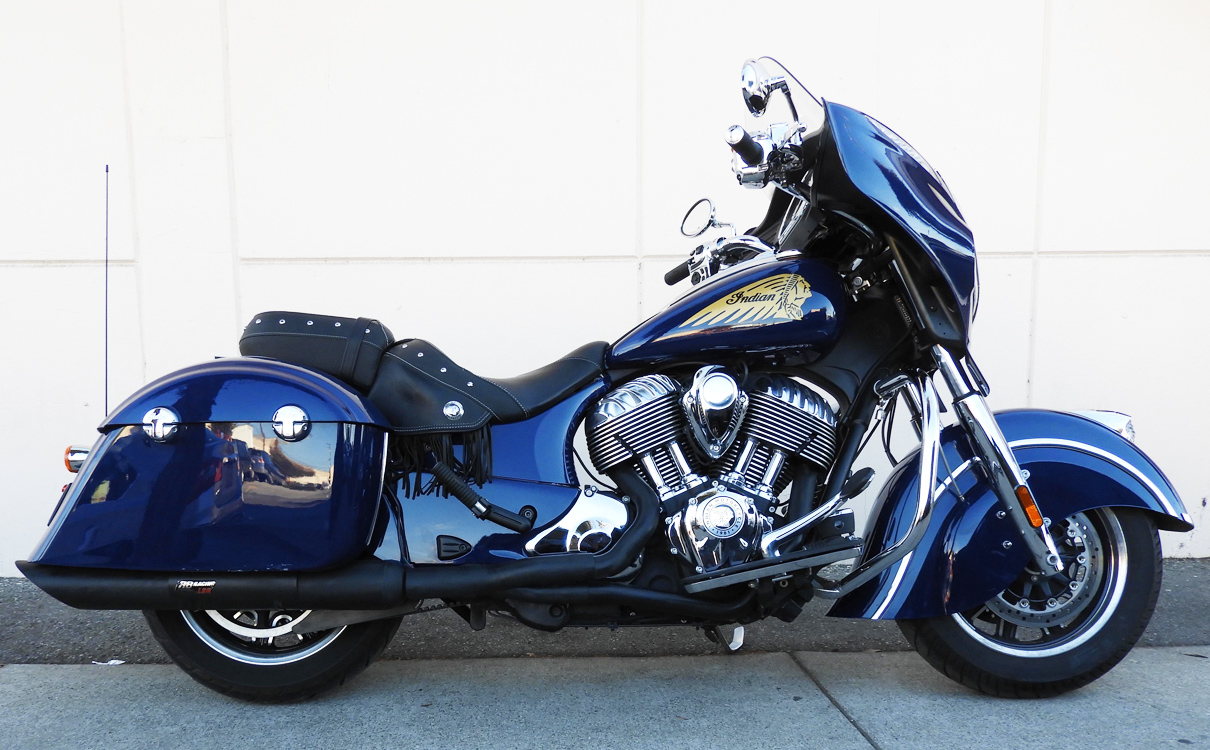
2018: Developed new Indian Chief true LSR 2-1 exhaust systems with separate left side bag support system
